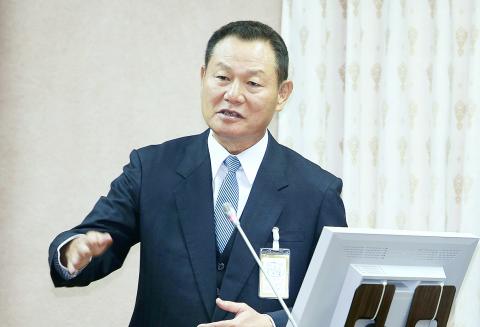A National Security Bureau (NSB) plan to establish a new department for cybersecurity in the coming months has received wide support among legislators, but some expressed concerns about security over recruiting “hackers” to work in government offices.
Bureau Director-General Lee Shying-jow (李翔宙) confirmed during a legislative session on Thursday that preparations are under way to recruit computer professionals from the private sector to staff the new cybersecurity unit, which is scheduled to start operating on May 1.
The new unit is to be designated the 7th Department (第七處) of the NSB and will have four working divisions: general services; research and development; countercyberattack; and network system defense.

Photo: CNA
The establishment of the new department represents the largest restructuring the bureau has undergone in two decades, and is seen as an important policy initiative and personal accomplishment of the current bureau chief.
The bureau, which is in charge of national security and intelligence affairs, was established in 1954 as an outgrowth of a division within the Department of Special Affairs in the Presidential Office.
After the lifting of martial law, the bureau’s mandate and organization with six major departments were set out in the Organization Act for the National Security Bureau (國家安全局組織法) of 1994.
Democratic Progressive Party Legislator Tsai Huang-liang (蔡煌瑯) questioned the inherent risks of employing “hackers” to conduct cyberwarfare missions, saying they might pose a threat to national security.
Lee disagreed on the use of the term “hackers,” saying they are “cybersecurity experts.”
“They have already performed some assigned tasks and have done very well. So, we are looking to amend the laws regulating information and communications to fully utilize their talents within the bureau’s framework, without infringing on national security,” Lee said.
Most legislators backed the plan and endorsed a proposal to increase the bureau’s budget and expand its mandate.
Some suggested that Lee recruit members of Taiwanese youth teams who have won top places in international hacking competitions.
However, some lawmakers expressed misgivings about whether these individuals would fit in in a government setting where rules and restrictions abound.
“These skillful computer professionals are highly creative, but they are unrestrained in their ideas and habits,” Chinese Nationalist Party (KMT) Legislator Lin Yu-fang (林郁方) said. “It would be difficult to properly manage them, which might lead to national security problems.”
“Our government agencies operate with a conservative mindset and in a highly restricted environment,” Tsai said. “It is unlikely that many young netizens and hackers would want to join the 7th Department.”
The bureau currently comprises six major departments, along with an Internal Security Department, a center for information collection and a Special Service Center for the personal protection of the president, vice president and their families.
The six departments are: international intelligence; intelligence operations focused on China; domestic security intelligence; analysis of national strategic intelligence; science and technology intelligence, and communication security; and research and development, and sections for deciphering and cipher code equipment.

MAKING WAVES: China’s maritime militia could become a nontraditional threat in war, clogging up shipping lanes to prevent US or Japanese intervention, a report said About 1,900 Chinese ships flying flags of convenience and fishing vessels that participated in China’s military exercises around Taiwan last month and in January last year have been listed for monitoring, Coast Guard Administration (CGA) Deputy Director-General Hsieh Ching-chin (謝慶欽) said yesterday. Following amendments to the Commercial Port Act (商港法) and the Law of Ships (船舶法) last month, the CGA can designate possible berthing areas or deny ports of call for vessels suspected of loitering around areas where undersea cables can be accessed, Oceans Affairs Council Minister Kuan Bi-ling (管碧玲) said. The list of suspected ships, originally 300, had risen to about

DAREDEVIL: Honnold said it had always been a dream of his to climb Taipei 101, while a Netflix producer said the skyscraper was ‘a real icon of this country’ US climber Alex Honnold yesterday took on Taiwan’s tallest building, becoming the first person to scale Taipei 101 without a rope, harness or safety net. Hundreds of spectators gathered at the base of the 101-story skyscraper to watch Honnold, 40, embark on his daredevil feat, which was also broadcast live on Netflix. Dressed in a red T-shirt and yellow custom-made climbing shoes, Honnold swiftly moved up the southeast face of the glass and steel building. At one point, he stepped onto a platform midway up to wave down at fans and onlookers who were taking photos. People watching from inside

Japan’s strategic alliance with the US would collapse if Tokyo were to turn away from a conflict in Taiwan, Japanese Prime Minister Sanae Takaichi said yesterday, but distanced herself from previous comments that suggested a possible military response in such an event. Takaichi expressed her latest views on a nationally broadcast TV program late on Monday, where an opposition party leader criticized her for igniting tensions with China with the earlier remarks. Ties between Japan and China have sunk to the worst level in years after Takaichi said in November that a hypothetical Chinese attack on Taiwan could bring about a Japanese

STREAMLINED: The dedicated funding would allow the US to transfer equipment to Taiwan when needed and order upgraded replacements for stockpiles, a source said The US House of Representatives on Thursday passed a defense appropriations bill totaling US$838.7 billion, of which US$1 billion is to be allocated to reinforcing security cooperation with Taiwan and US$150 million to replace defense articles provided to the nation. These are part of the Consolidated Appropriation Act, which the US House yesterday passed with 341 votes in favor and 88 against. The act must be passed by the US Senate before Friday next week to avoid another government shutdown. The US House Committee on Appropriations on Monday unveiled the act, saying that it allocates US$1 billion for the Taiwan Security Cooperation Initiative